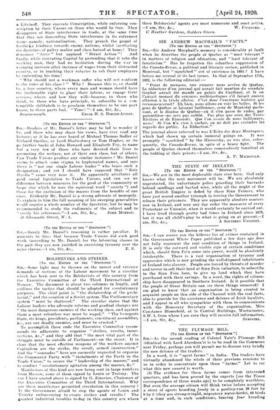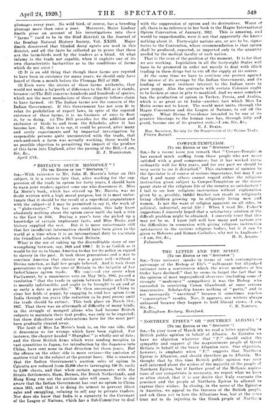THE PLUMAGE BILL.
[To THE EDITOR Or THE " SPECTATOR."] SIR,—As the second reading of Colonel Yate's Plumage Bill (identical with Lord Aberdeen's) is to be read in the Commons next Friday, perhaps you will permit me to discuss very briefly the new defence of the traders.
In a word, it is " egret farms" in India. The traders have virtually abandoned the whole of their previous evasions to us in order to concentrate upon these " farms." Let us see what this new canard is worth.
(1) The evidence for these farms comes from interested quarters, and has been proved by the experts [see the Times correspondence of three weeks ago] to be completely worthless. But even the average citizen will think twice before accepting a story of egrets breeding freely in a poultry-run 20 feet by 8 by 8 (they are strong-winged, migratory water-birds), 60 birds at a time and, in such conditions, bearing four breeding plumages every year. No wild bird, of course, has a breeding plumage more than once a year. Moreover, Major Lindsay Smith gives an account of his investigations into these " farms " (said to be in the Sind district) in the Journal of the Bombay Natural History Society, Vol. XXIII. Major Smith discovered that blinded decoy egrets are used in this district, and all the facts he collected go to prove that these are the farm-birds used by the traders as a blind. Of what infamy is the trade not capable, when it exploits one of its own characteristic barbarities as to the conditions of farms which do not exist ?
(2) It is an odd thing that though these farms are reputed to have been in existence for many years, we should only have heard of them a month before the Plumage Bill of 1920.
(3) Even were the stories of these farms authentic, they would not make a ha'porth of difference to the Bill as it stands, because :(a)The Bill concerns hundreds and hundreds of species, which not the most mendacious of these slippery fellows claim to have farmed. (b) The Indian farms are the concern of the Indian Government. If this Government has not seen fit to relax its prohibition of export laws, in spite of the reputed existence of these farms, it is no business of ours to flout it, by so doing. (c) The Bill provides for the addition and exclusion of birds to and from the Schedule, after it has become law. If, that is to say, it could be proved, after many and costly experiments and by impartial investigation by responsible persons quite unconnected with the trade, that such-and-such a farm was actually working, there would be no possible objection to permitting the import of the produce of this farm into England, after the passing of the Bill.—I am,
April 171h.



































 Previous page
Previous page